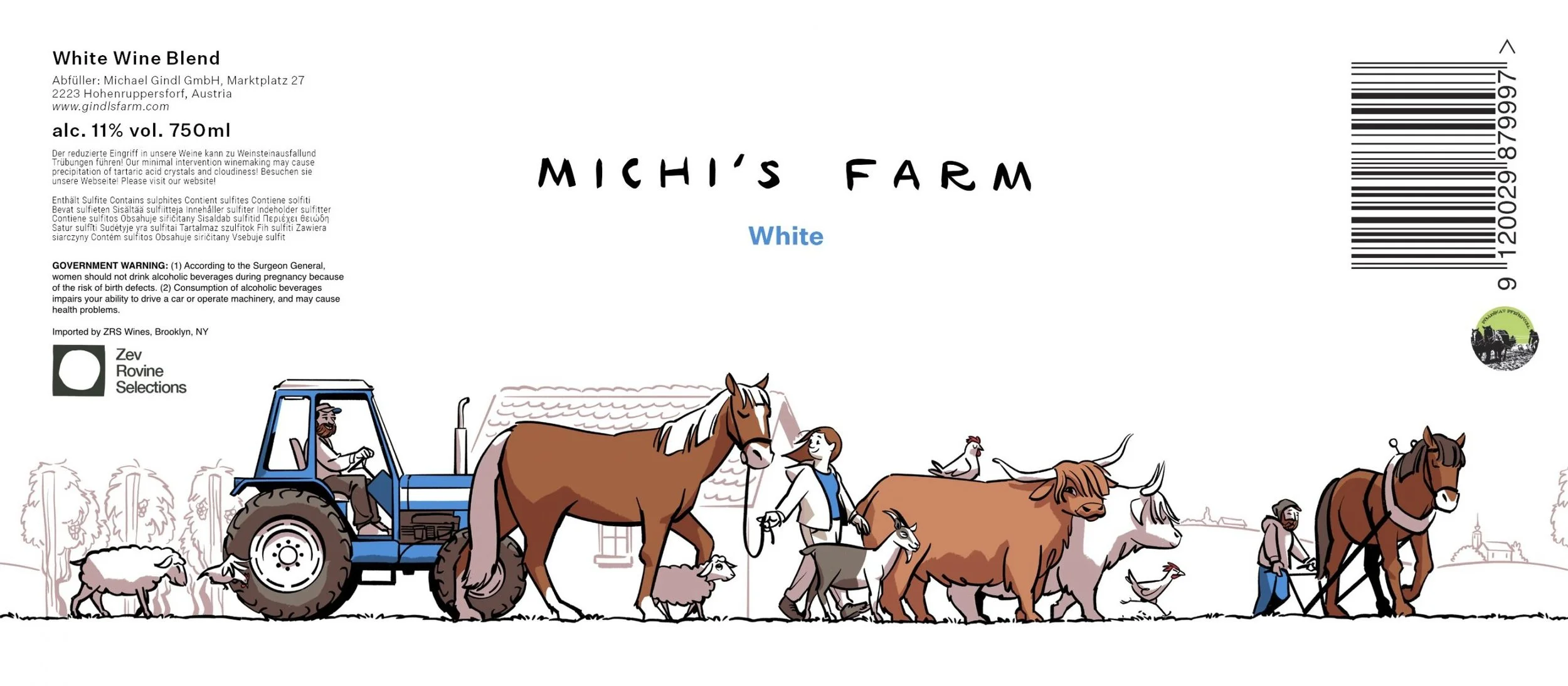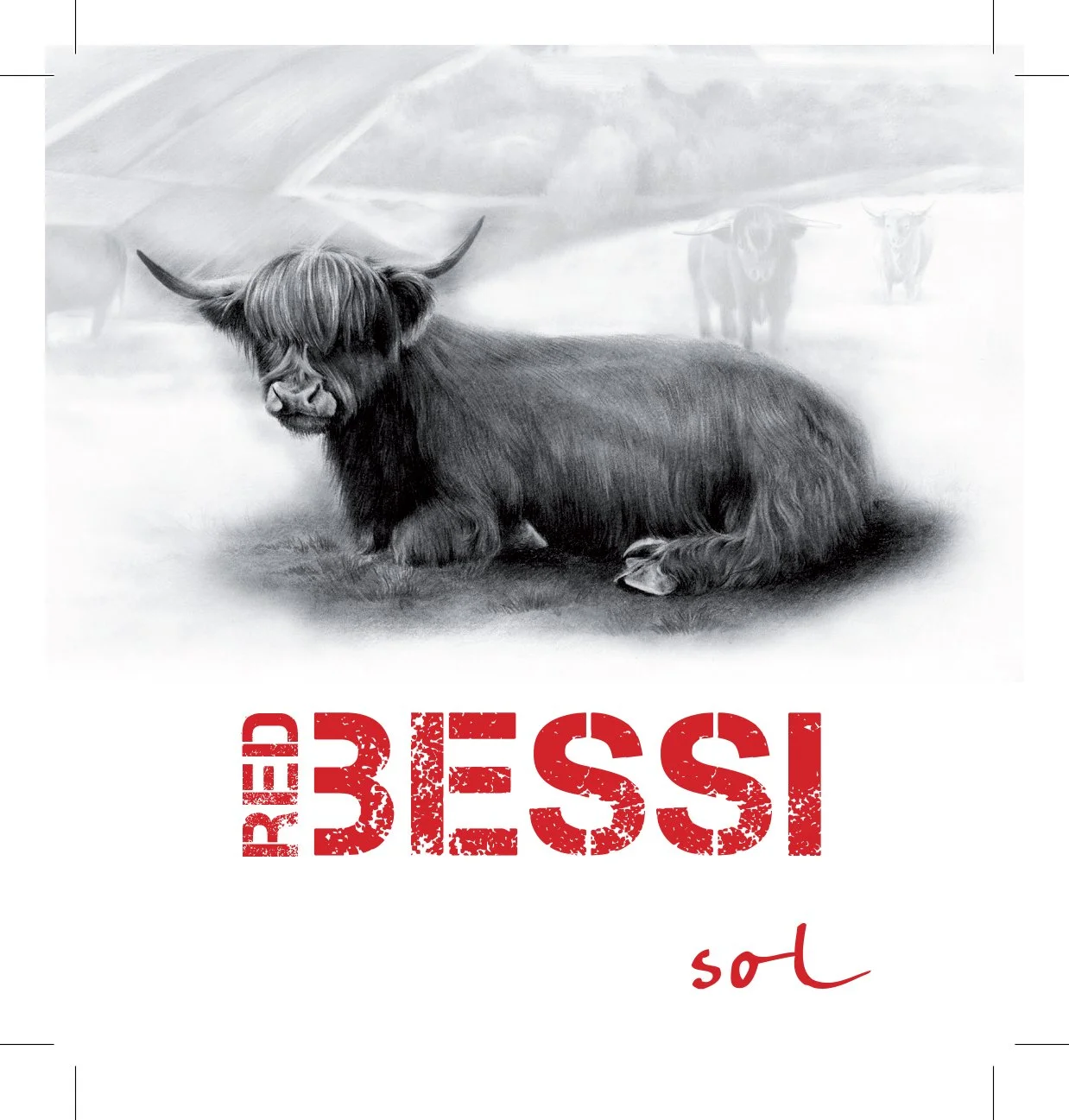Michael Gindl
COUNTRY: Austria
REGION: Weinviertel
The Gindl farm, which has been in the family since 1807, has long practiced mixed agriculture. Conventional crops and livestock, as well as forestry and wine production share the attention of the land and the people who work it. Michael Gindl, born in 1983, had already begun managing the family’s winemaking operation by the time he graduated agricultural school in 2002. Taking over the entire farm soon after, Michael began steering their operations toward biodynamics and total self-sufficiency. This meant expanding the farm’s acreage, adding new animal species, and working more broadly to align his practices with the ideals and standards of the Demeter association of biodynamic farming.
Michael’s efforts at optimization are relentless. In the past decade, he has begun breeding highland cattle, as well as horses to work in his 10 hectares of vines. Breton dwarf sheep pull their weight by grazing in the vineyards, and pigs are the object of the Gindl farm’s nascent butchering operation. Increasingly favoring wooden barrels over steel tanks, Michael harvests acacia and oak from his own forests to construct vessels for fermentation and aging. Increasingly, the dynamic and varied practices at work on the Gindl estate allow it to closely embody the biodynamic ideal of a holistic, autonomous farm.
Michael’s grapes are harvested by hand and pressed very gently before undergoing a spontaneous fermentation without the assistance of selected yeast or temperature control. The wines are rarely racked, and are always left unfined and unfiltered, with zero or minimal added sulfur. In summation of his winemaking practices, Michael says: “I really try to do as little as possible – in fact, nothing!”
CUVÉES
“L’Étrangère Die Ausländerin”
Grape: Grüner Veltliner
Vineyard: Eben and Staatz vineyard, practicing biodynamic, 40+ year old vines, loam soil
Winemaking: grapes from Eben vineyard direct press into barrel, destemmed berries added on top of the juice, barrel topped up with juice from Staatz vineyard. racked twice, bottled in Feb 2023.
Added S02: 20mg/l before bottling
Lainie Taillefer is a nomadic winemaker who made her first wine at MicroBio Wines in Spain in 2019. She spent the 2022 harvest making this wine at the domaine of Michael Gindl.
Michi’s Farm White
Grape: Grüner Veltliner, Gelber Muskateller, Riesling. Certified organic fruit from neighbors in Weinviertel.
Soil: loam, loess, sandstone
Winemaking: fermentation in a mix of stainless steel and used barrels
Aging: on fine lees
Added S02: none
“SOL”
Grape: Pinot Blanc, Grüner Veltliner
Soil: loam, loess, sandstone
Average Age of Vines: 45 years
Winemaking: destemmed, pigéage, 12 hour maceration of 50% of the grapes, 8 hour slow press, 4 month maceration of 50% of the grapes
Aging: 18 months in oak barrels
Added S02: none
“Buteo”
Grape: Grüner Veltliner
Soil: loam, loess, sandstone
Winemaking: 4-8 hour maceration, 8 hour slow press, spontaneous fermentation in oak
Aging: 6 months in oak
Added S02: none
“Buteo 12”
Grape: Grüner Veltliner
Soil: loam, loess, sandstone
Winemaking: 10 hour maceration, 8 hour slow press, spontaneous fermentation in wood
Aging: 12 months in acacia barrels
Added S02: none
“Sodalis” Weissburgunder
Grape: Pinot Blanc
Soil: loam, loess, sandstone
Average Age of Vines: 30-35 years
Winemaking: 5 day maceration, 2-4 month spontaneous fermentation in new oak
Aging: 12 months in new oak
Added S02: minimal
“Red Bessi”
Grape: Zweigelt, Cabernet Sauvignon
Soil: loam, loess, sandstone
Winemaking: whole cluster, 6 month spontaneous fermentation on skins
Aging: Zweigelt spends 24 months in new oak, Cabernet Sauvignon spends 12 months in new oak
Added S02: minimal
Michi’s Farm Orange
Grape: Grüner Veltliner, Gelber Muskateller, Riesling. Certified organic fruit from neighbors in Weinviertel.
Soil: loam, loess, sandstone
Winemaking: 3 weeks of maceration on the skins, fermentation in a mix of stainless steel and used barrels
Aging: on lees
Added S02: none
Michi’s Farm Red
Grape: Zweigelt, Blauer Portugieser, Cabernet Sauvignon. Certified organic fruit sourced from neighbors in Weinviertel.
Soil: loam, loess, sandstone
Winemaking: Whole cluster fermentation in stainless steel, then transferred to a mix of stainless steel and old wooden barrels
Aging: 9 months
Added S02: minimal
“Flora”
Grape: Riesling, Sämling 88, Gelber Muskateller
Soil: loam, loess, sandstone
Winemaking: 3 hour maceration of Gelber Muskateller and Sämling 88, 18 hour maceration of Riesling, 8 hour slow press, spontaneous fermentation in staineless steel
Aging: 6 months in stainless steel
Added S02: none
“Little Buteo”
Grape: Grüner Veltliner
Soil: loam, loess, sandstone
Winemaking: 50% direct press, 50% 4-8 hour maceration, spontaneous fermentation in stainless steel
Aging: 6 months in stainless steel
Added S02: none
“Sodalis” Riesling
Grape: Riesling
Soil: loam, loess, sandstone
Average Age of Vines: 20-25 years
Winemaking: 2 day maceration, spontaneous fermentation in neutral acacia
Aging: 12 months in neutral acacia
Added S02: none
“Bubbles Pet Nat”
Grape: Roesler, Blauburgunder
Soil: gravel, loess
Average Age of Vines: 21-31 years
Winemaking: 4 day spontaneous fermentation in stainless steel
Aging: méthode ancestrale
Added S02: none
“White Bessi”
Grape: Weißburgunder, Sämling, Zweigelt
Soil: loam, loess, sandstone
Average Age of Vines: 20-40 years
Winemaking: 3-6 month spontaneous fermentation in oak
Aging: 12-36 months in oak
Added S02: minimal
“Nanu!?”
Grape: Zweigelt
Soil: loam, loess, sandstone
Average Age of Vines: 20-45 years
Winemaking: direct press, spontaneous fermentation in amphora
Aging: 6 months in barrels sur lie
Added S02: minimal
















